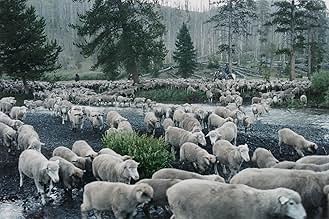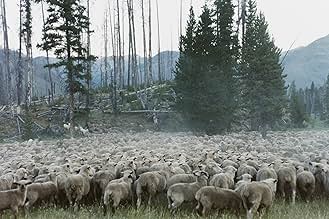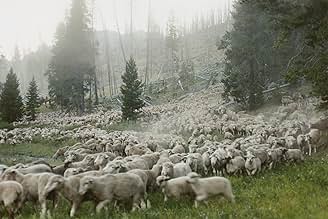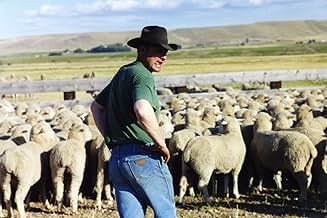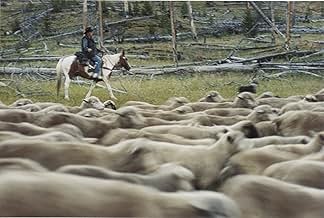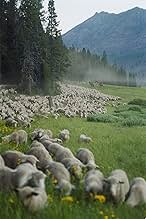In the summer of 2003, a group of shepherds took a herd of sheep one final time through the Beartooth Mountains of Montana, in the extreme north-west of the United States. It was a journey o... Read allIn the summer of 2003, a group of shepherds took a herd of sheep one final time through the Beartooth Mountains of Montana, in the extreme north-west of the United States. It was a journey of almost three hundred kilometres through expansive green valleys, by fields of snow, and ... Read allIn the summer of 2003, a group of shepherds took a herd of sheep one final time through the Beartooth Mountains of Montana, in the extreme north-west of the United States. It was a journey of almost three hundred kilometres through expansive green valleys, by fields of snow, and across hazardous, narrow ridges - a journey brimming with challenges. The aging shepherds ... Read all
- Directors
- Awards
- 1 win & 10 nominations total
Featured reviews
Another of the more critically acclaimed documentaries from last year, this one tells the story of modern day cowboys herding sheep one last time through the Absaroka Beartooth mountain range in Montana in the summer of 2003. It's directed by Lucien Castaing-Taylor (although uncredited), a Harvard anthropologist, and llisa Barbash (his wife) and produced by Barbash. The film has no music or narration and appears to be somewhat randomly edited together with no real story or message to deliver. It's extremely slow paced and lacking any kind of focus.
The film follows a family of sheepherders as they make their final summer herd through the mountains of Sweet Grass County. It was filmed in 2001 to 2003 at a time when this was still a way of life for some. There's very little dialogue and what there is contains a lot of vulgar language. The film is not rated but would be rated R due to the extreme amount of F words used throughout. We see the herders at their grimmest and most unlikeable as they toss the sheep around and constantly curse them out.
The film is, as I mentioned, very slow and quite dull for almost it's entirety. The scenery is beautiful though and the video is somewhat intimate. It often feels like the herders don't even know they're being filmed as they go about their daily business. It's definitely not a film for everyone and will only please a select audience but if you're into honest documentaries with no other BS you'll probably enjoy it.
Watch our review show 'MOVIE TALK' at: http://www.youtube.com/watch?v=003J1CrnYDk
It's that kind of skill, no, art that is so evident in these guys: keeping order in the herd, whittling rough branches for the spines of their tents, sleeping with one ear open for sounds of bear and wolverine, sharpshooting in the night aided only by lamp. These guys do it all and well. They can also midwife a ewe in the crisis of giving birth, find an udder for an orphaned lamb and cleanly, expertly fleece these critters when the wool is heavy.
These cowboys never get rich inspite of a bagful of skills and talents that leave the viewer in respectful admiration. Watching the travail of these guys makes you realize you have never in your life known the true meaning of "hard work."
This is a documentary without any taped-on background music and without any warm-toned narrator telling you what you're seeing. Not even Morgan Freeman. The footage tells the story without extraneous aids. The absence of other noise is welcome. This piece is awesome but it's also funny, not just in the humanity of the cowboys. There's some real comic talent among those woolies, too. Jim Smith
The camera records a group of sheep farmers and herders preparing a flock and getting them across the mountains. The focus is on everyday details of animal tending and herding, straightforward and unsentimental. The people working with the sheep seem mostly unconscious of the cameras, just going about their business. It's like seeing into another life.
Of course, it's another life that's centered around sheep. If that sounds boring, this probably isn't the film for you, because that's all there is to it, and it's slow-paced. It's very different from Discovery Channel style documentaries that try to teach and entertain. There's no Mike Rowe here to relate everything he's doing to you so that you can understand what's going on.
But there's something to be said for just watching things happen.
The movie isn't trying to reach out and explain itself to you, and that enables it to draw you in, if you're willing to go along for the ride.
Did you know
- Crazy creditsIn the end credits, the very last entry reads "In Memoriam The Raisland - Allestad Ranch Wild Cat Creek, Sweetgrass County, Montana 1900 - 2004"
Details
- Release date
- Countries of origin
- Official sites
- Language
- Also known as
- The Open: BeComing Animal
- Filming locations
- Production companies
- See more company credits at IMDbPro
Box office
- Gross US & Canada
- $207,473
- Opening weekend US & Canada
- $9,870
- Jan 10, 2010
- Gross worldwide
- $209,204
- Runtime
- 1h 41m(101 min)
- Color
- Sound mix
- Aspect ratio
- 1.85 : 1


